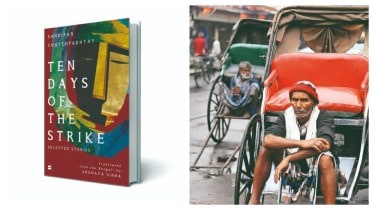Half-a-century ago, Sandipan Chattopadhyay’s short stories created a flutter in Bengali literature. His powerful and provocative prose made many take notice of a new language on the daily life of ordinary people he introduced to the reader. Chattopadhyay would go on to receive several accolades, including a Kendriya Sahitya Akademi award and the Bankim Puraskar. Now, nearly two decades after his death, a new collection of short stories in English translation offers a rare view into the Bengali author’s signature style and vision.
Ten Days of the Strike, translated from the Bengali by Arunava Sinha, has ten of Chattopadhyay’s short stories, some from the early years of his literary career. The titular story reflects the author’s deep gaze on the mundane life of the common people. Factory worker Shubhobroto is ecstatic after a hard-fought victory over the management that conceded the workers’ demand for an eight per cent bonus after protests lasting for over a month. His celebrations are curtailed by a toilet at his home that suddenly starts to overflow. To make matters worse, his wife Kuntala, a stickler for cleanliness, demands an immediate resolution of the domestic agitation.
Chattopadhyay’s clinical observation of the daily domestic struggles of ordinary people is directly linked to the politics outside impacting their lives. In The Revolution and Rajmohan, a middle-aged office employee is contemplating suicide with a gun. As a loud procession of protesters walks past his home, Rajmohan remembers his elder brother who threw himself in front of a moving train, and a childhood friend who died of burns from a fire in his kitchen. The loss and grief leave him with only the characters from the novels he has read who come filing into his life.
When he is pinning his sharp focus on relationships, the author veers away from conformism. With Ruby in Diamond Harbour, the opening story of the collection, is about a married man having an affair with his office colleague. With hotels in their sprawling city offering no intimacy for couples without a wedding tag, they do a getaway to Diamond Harbour, “where you need to take nothing but the traditional tumbler and blanket of the migrant”. In The Last Metro, another relationship rips through the city’s restaurants to find safe spots to share their love, but not necessarily for each other.
The collection reserves its searing survey of relationships, this time between people and politics, in Banabehari and I, the story of a couple tethered to the Leftist ideology. Pratibha Sen and Banabehari are members of the ruling Communist party in Bengal. Their story spans a long period of service to the party, which came to power in 1967 with the end of the Congress rule, before they passed it onto a new political dispensation a few decades later. Through the prism of their lives, Chattopadhyay shows the spasmodic transformation of the Communist party sworn to the revolution. There is the arrival of a new Communist chief minister, Jyoti Basu, and even the creation of a new radical Leftist party by Charu Majumdar who calls for converting the decade of the ’70s into a ‘decade of freedom’.
In the middle of political and domestic changes, Pratibha Sen and Banabehari soon see their lives lose their moorings. Sen becomes blind and her husband’s morality crosses into the criminal realm. Soon there is an inquisition from within about the success and failure of revolutions. “One revolution after another might fail, but still the right to revolt is the only right of humans. Yes, the only one,” says the alter ego of Banabehari. In the meantime, history would go through some burning and rebirth, just like the skewed vision and mind of the humans.
Faizal Khan is a freelancer
Book details:
Title: Ten Days of the Strike: Selected Stories
Author: Sandipan Chattopadhyay
Publisher: HarperCollins
Number of pages: 344
Price: Rs 499
